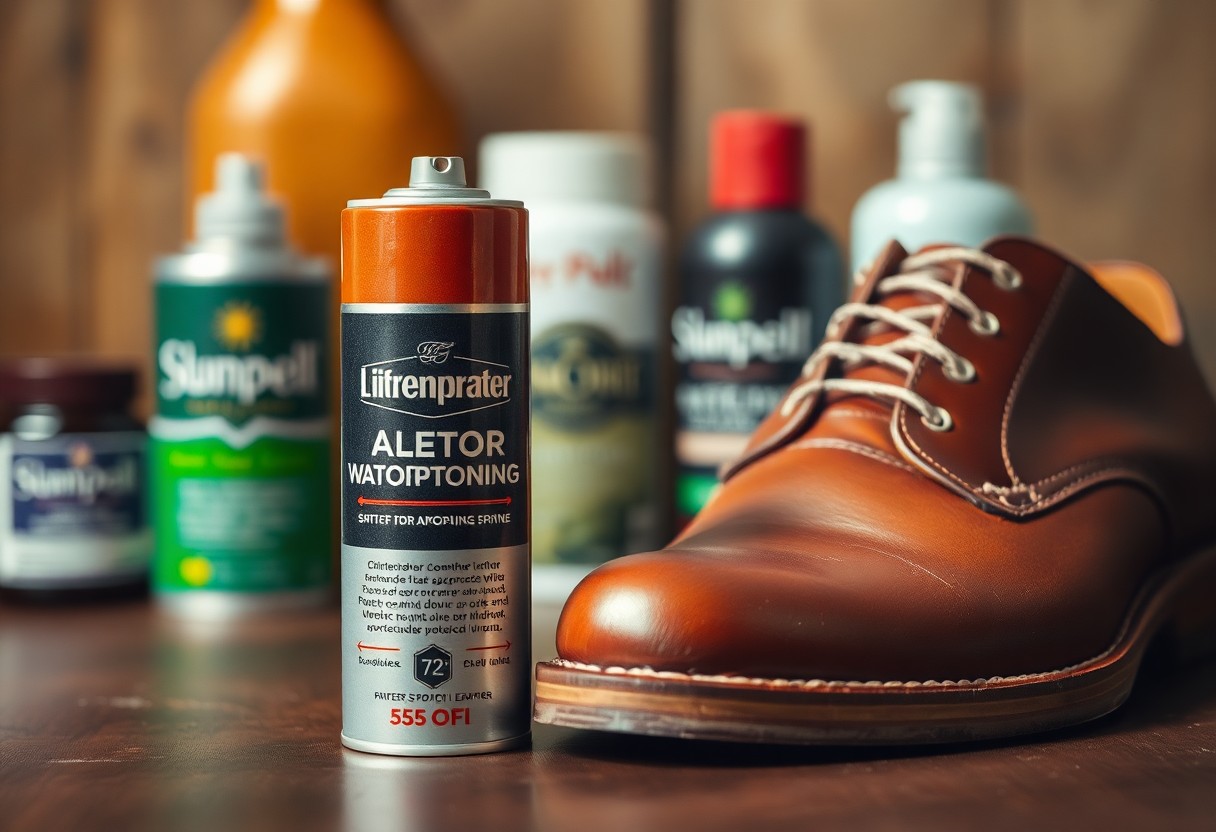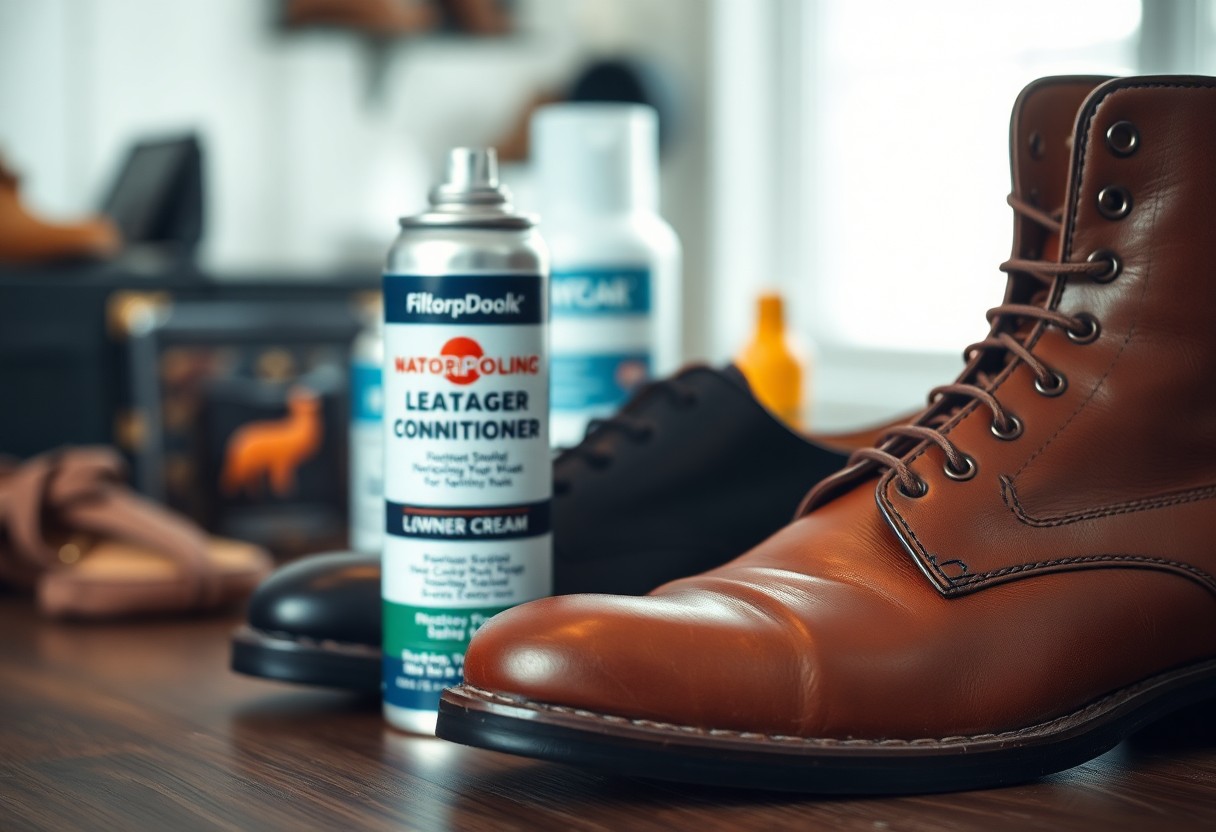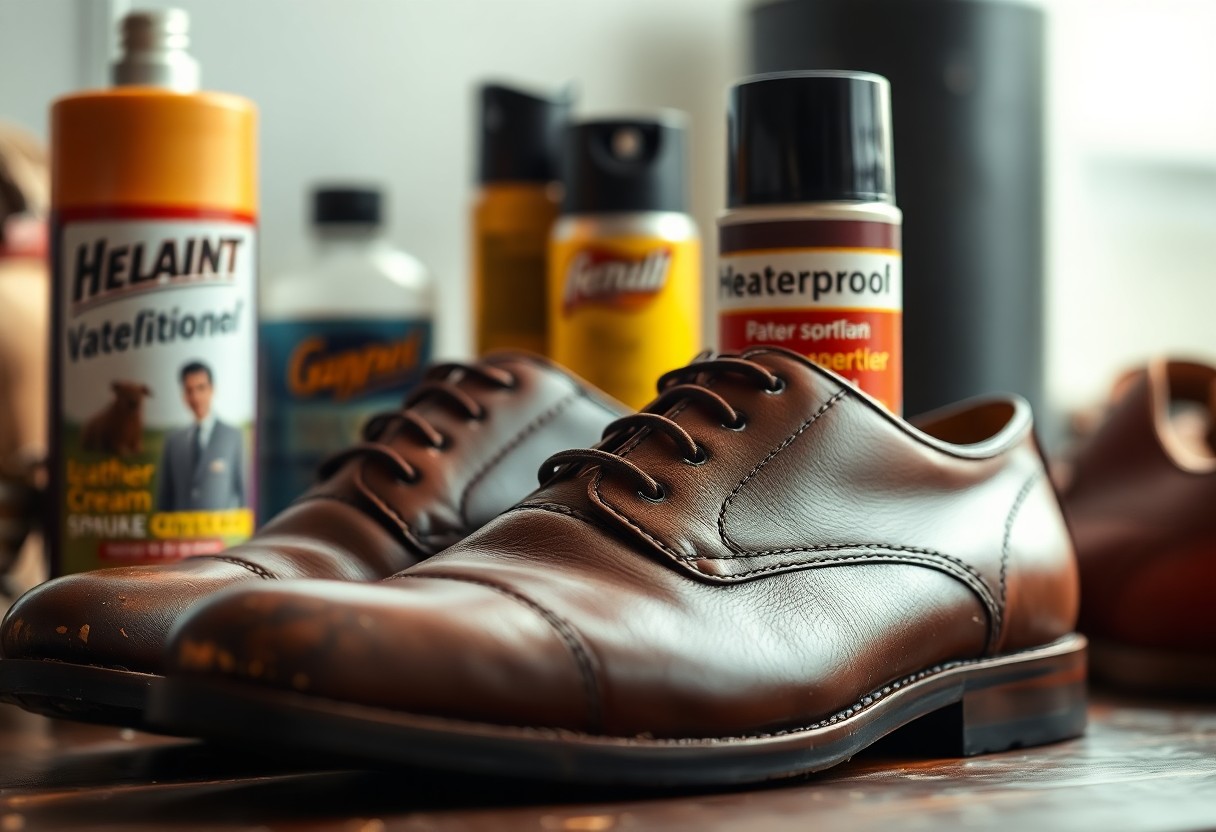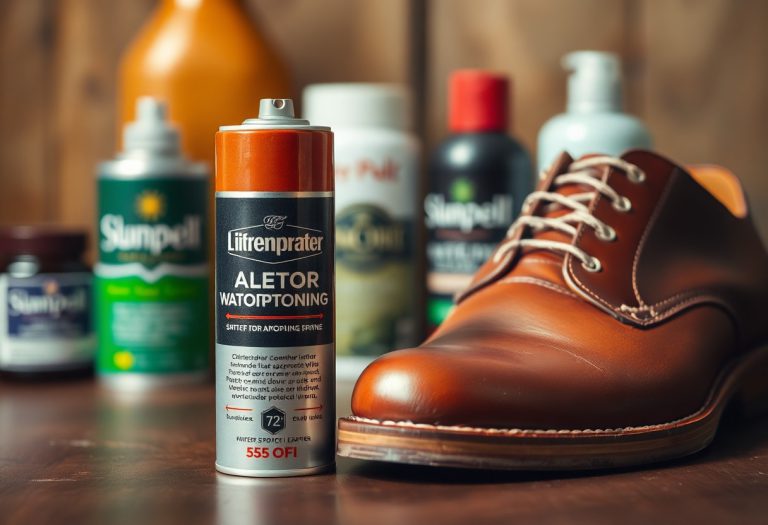Avoiding Common Leather Care Pitfalls is crucial for preventing irreparable damage to your cherished footwear. A prevalent mistake involves applying waterproofing spray on smooth leather. While these sprays may appear to be a quick fix for protecting your shoes, they actually hinder essential nutrients from permeating the leather, which can result in dryness and cracking as time goes by. Although smooth leather has some inherent water-resistant qualities due to its grain structure, it still requires consistent nourishment through shoe creams and waxes to ensure its longevity. Rather than relying on sprays, opt for premium leather conditioners and wax polishes that effectively nourish and protect the leather, thereby enhancing its lifespan while preserving its natural characteristics.
Expert Strategies for Effective Leather Protection and Longevity
To maximize the lifespan of your leather items, it is essential to comprehend their protective features. Full grain leather is celebrated for its natural resistance to water, thanks to its tightly woven fiber structure. Nevertheless, these protective attributes require ongoing maintenance to perform optimally. The durability of your leather is heavily reliant on the quality of care it receives. Using waterproofing sprays can compromise the leather’s breathability, leading to significant deterioration over time if not managed appropriately. Regular upkeep, including conditioning and proper cleaning techniques, is vital for safeguarding the integrity and aesthetic appeal of your leather possessions.
Discovering the Unique Advantages of Full Grain Leather
After the tanning process, full grain leather retains its original surface layer, which provides remarkable natural protection. Products crafted from this material feature an intact grain layer that offers inherent resistance to moisture and wear. This outer layer is enriched with natural oils and fibers that form a protective barrier, making additional waterproofing sprays unnecessary and potentially detrimental to the leather’s vitality. Recognizing these characteristics can empower you to make informed decisions about leather care, ensuring your items not only maintain their appearance but also endure the test of time.
Understanding Leather’s Moisture Management and Aging Effectively
Grain leather must retain its ability to absorb and release moisture efficiently. The pores in your leather facilitate breathability and moisture regulation, which are crucial for maintaining flexibility and preventing unsightly cracks. However, the application of waterproofing sprays can seal these pores, hampering essential airflow and disrupting the natural moisture equilibrium vital for the health of the leather. As leather ages, it also requires proper nourishment through conditioning products. The use of waterproofing sprays creates a barrier that prevents essential conditioning oils from penetrating the leather, leading to dryness and brittleness over time. Regularly applying leather cream allows your leather to age gracefully while developing a rich, attractive patina.

Avoiding the Common Pitfalls of Waterproofing Spray
Many individuals mistakenly assume that waterproofing spray is the ultimate safeguard for their leather shoes, but this widespread misconception can lead to serious damage to your footwear. While these sprays offer immediate protection against water intrusion, they simultaneously inhibit essential nutrients from penetrating the leather, paving the way for potential long-term degradation. Understanding the true impact of these products is essential for achieving optimal leather care and preserving the quality of your shoes.
Debunking Misleading Marketing Claims About Leather Care
Due to aggressive marketing campaigns and well-intentioned yet misguided advice from sales associates, you may have been led to believe that waterproofing spray is indispensable for all leather shoes. This misunderstanding is reinforced by numerous shoe retailers, who profit from the high margins and frequent repurchase rates associated with these products. In reality, regular smooth leather possesses inherent protective qualities that do not necessitate additional spray-on barriers for effective safeguarding. Educating yourself about proper leather care can help you avoid unnecessary expenses while prolonging the life of your footwear.
Evaluating Immediate Gains Against Long-term Leather Well-being
The deterioration of your leather shoes begins when waterproofing sprays form a barrier that prevents essential oils and conditioning agents from absorbing into the leather. Although you may initially notice improved water resistance, the reality is that your leather gradually becomes dry and brittle without the vital nourishment it needs. The consequences of using waterproofing sprays on smooth leather extend beyond superficial protection. Your leather requires continuous nourishment to maintain its flexibility and durability. When shoe creams and conditioners are unable to penetrate the leather due to the spray barrier, the material risks cracking and degradation, substantially shortening the lifespan of your shoes. Natural waxes and appropriate conditioning methods offer superior long-term protection while promoting the overall health of the leather.

Delving into the Science of Effective Leather Care
A fundamental aspect of successful leather care is understanding its molecular structure. The collagen fiber networks in your leather shoes need both protection and nourishment. When applying products to leather, these can interact with the fibers either by coating them or penetrating deeply into their structure. This interaction is crucial for maintaining the long-term health of your leather shoes. Gaining a deeper understanding of this process can empower you to make informed choices regarding which products to utilize.
Recognizing the Importance of Regularly Nourishing Leather
It is vital to acknowledge that your leather shoes require consistent nourishment to preserve their quality. The natural oils contained in your leather help prevent cracking and maintain flexibility. Over time, these oils diminish due to regular wear and exposure to environmental elements. To safeguard the leather’s structural integrity, it is essential to replenish these oils through regular conditioning with appropriate products.
Identifying the Detrimental Effects of Waterproofing Sprays
A significant downside of waterproofing sprays is their propensity to create a barrier. When these sprays are applied to smooth leather, they form an impenetrable layer that obstructs both water and essential nutrients. This barrier prevents your leather care products from effectively penetrating the surface, leading to a gradual decline in the leather’s quality over time. Understanding this effect can help you avoid products that may inadvertently harm your leather in the long run.
The barrier created by waterproofing sprays fosters a concerning cycle for your shoes. While these sprays effectively block water, they simultaneously inhibit the absorption of conditioning products critical for maintaining the leather’s health. As a result, the leather may appear safeguarded on the surface, yet it is actually dehydrating and becoming brittle underneath. Silicone-based sprays are particularly harmful, as they establish a permanent barrier that is challenging to remove without damaging the leather.
Applying Proven Techniques for Leather Protection
Contrary to common misconceptions, smooth leather shoes necessitate specific care methods that align with the natural properties of full-grain leather. The most effective strategy combines traditional care practices with products designed to enhance the leather’s inherent protective qualities, ensuring both immediate safeguarding and lasting durability for your footwear.
Utilizing the Benefits of Wax-based Solutions
An effective alternative to waterproofing sprays is high-quality wax-based products. These solutions work in synergy with your leather’s natural grain instead of counteracting it. When you apply wax polish, it forms a protective layer that still allows the leather to breathe, making it especially advantageous for toe caps and high-wear areas of your shoes.
Enhancing Leather Quality with Cream and Conditioner Applications
Unlike conventional spray treatments, leather creams and conditioners offer essential nourishment while preserving the leather’s natural protective qualities. Your shoes benefit from oils that deeply penetrate the material, preventing drying and cracking. Moreover, consistent application of cream and conditioner creates a cumulative effect that improves leather quality over time. The natural oils found in these products support the leather’s flexibility and durability, allowing it to develop a stunning patina. It is recommended to apply these products every 4-6 wears to maintain optimal leather condition.

Identifying Appropriate Scenarios for Waterproofing Spray Usage
In contrast to smooth leather, certain materials greatly benefit from waterproofing sprays. These products create an effective water-resistant barrier on specific materials that lack natural protection. Waterproofing sprays are particularly advantageous for suede, nubuck, and various textiles, where the material’s structure does not offer inherent moisture resistance.
Boosting Suede and Nubuck Resilience with Waterproofing Spray
Applying waterproofing spray to your suede or nubuck shoes can significantly enhance their resistance to moisture damage. While many modern suede materials come pre-treated with factory waterproofing, applying additional protection can help sustain this defense over time. The use of spray establishes a protective barrier that effectively prevents water from penetrating these delicate materials, thereby preserving their appearance and integrity.
Ensuring Comprehensive Protection for Textile Footwear
In addition to leather alternatives, textile footwear requires specialized protection against water damage. Materials such as canvas, mesh, and synthetic fabrics can achieve improved water resistance through proper spray application. Most textile materials tend to be naturally absorbent, making them prone to water damage and staining. Using waterproofing sprays on textiles helps maintain the shape and color of your shoes. The barrier formed also prevents dirt and debris from embedding in the fabric fibers. It is advisable to reapply the spray every 3-4 months for optimal protection, depending on how frequently the shoes are worn and the prevailing weather conditions.
Professional Insights on Best Leather Care Practices
It’s important to note that not all leather treatments are created equal. Industry experts strongly discourage the use of waterproofing sprays on smooth leather. Full-grain leather shoes require specialized care that allows them to breathe while effectively absorbing nourishing treatments. Using inappropriate products can lead to leather damage that may incur hundreds of dollars in repairs or replacements.
Insights from Tannery Professionals
To maintain the quality of leather, tannery specialists emphasize that full-grain leather possesses inherent natural water-resistant properties in its outer layer. Preserving these protective qualities requires the application of oils and waxes. Waterproofing sprays can obstruct these essential treatments from reaching the leather, compromising its integrity and longevity over time.
Guidance from Professional Cobblers on Leather Upkeep
For the enduring care of leather, professional cobblers recommend opting for wax-based products instead of waterproofing sprays. Your shoes will benefit from treatments that both protect and nourish the leather. Research indicates that 90% of premature leather damage is attributed to the use of incorrect care products. By implementing proper leather care practices, your shoes can maintain an impressive lifespan of 15-20 years instead of just 2-3 years with inadequate maintenance. Traditional wax treatments allow leather to retain its natural attributes while providing adequate moisture protection. Your investment in quality leather footwear deserves meticulous care practices that sustain both its aesthetic appeal and durability.
Key Insights for Effective Leather Maintenance
Your smooth leather shoes demand meticulous care that excludes waterproofing sprays. Instead, choose shoe creams and waxes that nourish the leather while providing efficient protection against moisture. Full-grain leather inherently possesses protective qualities due to its grain layer, and waterproofing sprays may impede essential oils from penetrating the leather, leading to dryness and cracking. Reserve waterproofing sprays for suede, nubuck, or textile footwear where they can be beneficial. By selecting the appropriate products, you can effectively protect your leather shoes while ensuring their longevity.
Your Leather Care Queries Addressed
Q: Why is waterproofing spray detrimental to smooth leather shoes?
A: Waterproofing spray creates a barrier on leather that obstructs essential oils and conditioners from penetrating the material. Although it offers water protection, it interferes with the necessary nourishment of the leather, resulting in dryness and potential cracking over time, which ultimately diminishes the lifespan of the shoes.
Q: What alternatives should I use instead of waterproofing spray on smooth leather shoes?
A: It is advisable to use a combination of shoe cream and wax polish instead. Shoe cream supplies essential oils to nourish the leather, while wax polish forms a protective layer that helps repel moisture. This approach works harmoniously with the natural protective attributes of full-grain leather, maintaining the leather’s health while ensuring effective water resistance.
Q: Which types of footwear can I safely apply waterproofing spray to?
A: Waterproofing spray is appropriate for materials such as suede, nubuck, and textiles. These materials lack the natural protection found in smooth leather and thus benefit from the protective barrier established by waterproofing sprays. Many contemporary suedes and nubucks may already possess factory waterproofing treatments, but additional spray applications can enhance and sustain this level of defense.
The Article Why you shouldn’t use waterproofing spray on regular smooth leather and better alternatives appeared first on My Shoes Finder
The Article Waterproofing Spray on Smooth Leather: Risks and Alternatives Was Found On https://limitsofstrategy.com
References:
Waterproofing Spray on Smooth Leather: Risks and Alternatives





You’ve touched on a crucial aspect of leather care that many overlook. I used to rely heavily on waterproofing sprays, thinking I was doing my shoes a favor. However, after noticing some cracking on my beloved pair, I decided to dive deeper into leather maintenance. The difference is astounding when you switch to cream conditioners and wax polishes. Not only do they nourish the leather, but they also preserve its character and develop a beautiful patina over time.
It’s great to hear you’ve shifted your approach to leather care. Those waterproofing sprays can be tempting, but it’s fascinating how they can sometimes do more harm than good. Cream conditioners and wax polishes really allow the leather to breathe while adding nourishment.
You’ve pointed out some really important considerations with leather care. I had a similar experience with waterproofing sprays years ago. It can be tempting to think you’re safeguarding your shoes, but in reality, those sprays can cause more harm by creating a barrier that prevents the leather from breathing. Switching to cream conditioners and wax polishes has made such a difference for me, too.
You’ve really hit the nail on the head with the shift from waterproofing sprays to cream conditioners and wax polishes. I used to think waterproofing was the best way to protect my leather too, but it often does more harm than good, especially if it creates a barrier that prevents the leather from breathing. The way you describe the transformation is spot on—there’s something special about seeing leather age gracefully and develop that rich patina you mentioned.
It’s so true; many people just don’t realize how important it is to choose the right products for leather care. Those waterproofing sprays can seem like a quick fix, but they can sometimes do more harm than good, right? It’s great that you took the time to explore other options and found a better path.
You’ve made some excellent points about leather care that resonate with my own experiences. It’s easy to underestimate how crucial regular nourishment is for leather items, especially smooth leather. I once made the mistake of relying solely on waterproofing sprays for my favorite pair of leather boots, only to find them becoming increasingly brittle and dried out over time.
It sounds like you’ve had quite an experience with your leather boots, and it’s a lesson that many of us learn the hard way. It’s fascinating how we often look for quick fixes, like waterproofing sprays, without considering the underlying care leather really needs. That initial shiny finish on smooth leather can be misleading, making us think it doesn’t require much attention when, in fact, it craves regular nourishment to stay supple and vibrant.
You know, that’s the classic leather dilemma right there—a tale as old as time or at least as old as the last time someone tried to waterproof their boots and ended up with brittle bits instead. It’s like thinking you can keep a plant alive by just watering it once a year and slapping on a decorative pot. Spoiler: That plant is going to stage a revolt.
You’ve captured that leather dilemma perfectly. It’s such a fine balance between care and overthinking, isn’t it? I’ve had my own share of disasters with trying to keep leather items in good shape—like that time I got ambitious with a last-minute waterproofing spray on my favorite jacket. It turned into this awkward blend of stiffness and, well, regret.
You know, if you’re wrestling with that classic leather dilemma, I just read something that dives into the nitty-gritty of nubuck and roughout care—it’s got some solid tips to keep your boots from staging a revolt.
‘Nubuck Suede and Roughout Leather: Care Tips and Uses’
https://merrebes.com.au/nubuck-suede-and-roughout-leather-care-tips-and-uses/.
It’s interesting how easily leather care can slip our minds, isn’t it? Your experience with the waterproofing sprays really highlights a common misconception. A lot of us think that a quick spray can handle the moisture while letting the leather go without regular conditioning. But, as you figured out, that can lead to some serious long-term damage.